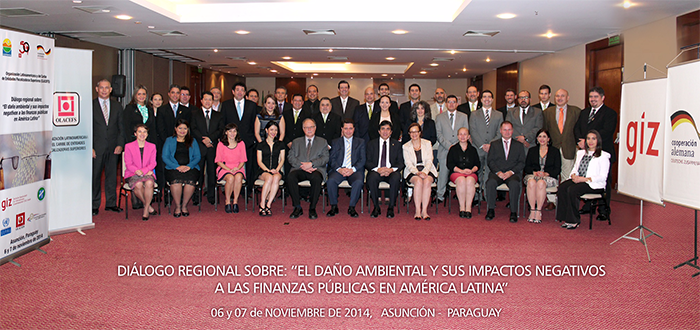Regional dialogue on “The environmental damage and its negative impacts on the public finances of Latin America”
The Agency for the International Cooperation (GIZ) of the Republic Federal of Germany, in collaboration with the Organization of Latin American and Caribbean Supreme Audit Institutions (OLACEFS) and its Special Technical Commission of Environment (COMTEMA) organized a Regional Exchange activity. The event: “Strengthening fiscal sustainability through CIAT in Latin America and the Caribbean and the support to OLACEFS” was held on November 6 and 7, 2014, in the city of Asunción, Paraguay.
As you will see in the attached program, this activity provided a forum for discussion on the topic: “The environmental damage and its negative impacts on the public finances of Latin America.” The Climate change is considered a key challenge for the environment and the sustainable development in the 21st century. It affects all continents and regions. The impact of climate change threaten to impair the progresses achieved in terms of reduction of poverty and the achievement of the Millennium Development Goals. Climate change financing deals with the financial resources that are available to the developing countries to mitigate and adapt the impacts of climate change. Therefore, the climate change financing is composed of all those financial flows in support of mitigation and adaptation (including capacity building, research and development, greater efforts to facilitate the transition to sustainable development and low carbon emissions. These resources can be public funds, private funds or public-private partnerships. The seminar that is convened is not a training, but an exchange of experiences on the public budget, which is one of the most important public policy tools. It is where the speech rhetoric is turned into the reality of the facts and where the real government priorities are shown-, where governments allocate resources to the different branches and units responsible of the climate change mitigation and adaptation. In this sense, the Executive Branch must be accountable for its climate change policy, and therefore transparent information on the resources allocated to this end must be available. Global climate financing architecture is complex: the funding is channeled through multilateral funds, such as the World Environment Fund and the Climate Investment Funds, as well as, increasingly, through bilateral channels.
Representatives of the Superior Audi Institutions (EFS) of 12 Latin American countries participated, as well as representatives of ECLAC, OLACEFS, CIAT and experts from Costa Rica and Ecuador in order to present the best practices.
See: Regional dialogue on “The environmental damage and its negative impacts on the public finances of Latin America” (Only available spanish)

